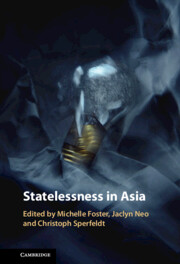Book contents
- Statelessness in Asia
- Statelessness in Asia
- Copyright page
- Contents
- Editor Bios
- Contributors
- Acknowledgements
- Notes on the Cover Image
- Abbreviations
- 1 Statelessness in Asia
- Part I Asia and the Phenomenon of Statelessness
- 2 Stateless in South Asia
- 3 Discrimination and Childhood Statelessness in Southeast Asia
- 4 Hidden Statelessness Dimensions of State Succession in Central Asia
- 5 Conflict and Statelessness
- Part II Statelessness and Intersecting Vulnerabilities
- Part III Challenges and Prospects for Change
- Table of Legislation
- Table of Treaties
- Index
5 - Conflict and Statelessness
A Case Study of Descendants of Kuomintang Secret Army in Thailand
from Part I - Asia and the Phenomenon of Statelessness
Published online by Cambridge University Press: 19 December 2024
- Statelessness in Asia
- Statelessness in Asia
- Copyright page
- Contents
- Editor Bios
- Contributors
- Acknowledgements
- Notes on the Cover Image
- Abbreviations
- 1 Statelessness in Asia
- Part I Asia and the Phenomenon of Statelessness
- 2 Stateless in South Asia
- 3 Discrimination and Childhood Statelessness in Southeast Asia
- 4 Hidden Statelessness Dimensions of State Succession in Central Asia
- 5 Conflict and Statelessness
- Part II Statelessness and Intersecting Vulnerabilities
- Part III Challenges and Prospects for Change
- Table of Legislation
- Table of Treaties
- Index
Summary
This chapter explores the impact of conflict on the issue of statelessness in Asia using a case study centred on the Kuomingtang (KMT) soldiers and their descendants in northern Thailand. The case study examines the historical background of the KMT Secret Army and conducts legal and policy analysis on relevant countries including the People’s Republic of China (PRC), the Republic of China (RoC) and Thailand. These analyses shed light on how the group became stateless. The chapter scrutinizes the nationality laws of each country linked to the case study and the practical implementation of these laws and offers observations on the statelessness phenomenon. The case study demonstrates that violent conflicts may lead to de jure statelessness or place people at risk of statelessness due to the loss of a sense of national belonging and legal identity documents as by-products of violent conflict; that (re)gaining citizenship of a country might not be easy as relevant laws change and the operation of laws become too difficult for vulnerable groups to manage; and that the long-lasting political consequences of conflict continue to influence state practice in the case of both PRC and RoC, regardless of the group’s rights under their respective nationality laws.
Information
- Type
- Chapter
- Information
- Statelessness in Asia , pp. 123 - 154Publisher: Cambridge University PressPrint publication year: 2025
